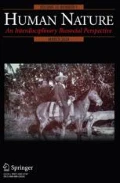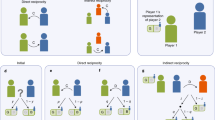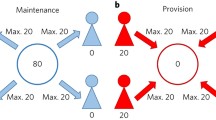Abstract
This paper provides strong evidence challenging the self-interest assumption that dominates the behavioral sciences and much evolutionary thinking. The evidence indicates that many people have a tendency to voluntarily cooperate, if treated fairly, and to punish noncooperators. We call this behavioral propensity “strong reciprocity” and show empirically that it can lead to almost universal cooperation in circumstances in which purely self-interested behavior would cause a complete breakdown of cooperation. In addition, we show that people are willing to punish those who behaved unfairly towards a third person or who defected in a Prisoner’s Dilemma game with a third person. This suggests that strong reciprocity is a powerful device for the enforcement of social norms involving, for example, food sharing or collective action. Strong reciprocity cannot be rationalized as an adaptive trait by the leading evolutionary theories of human cooperation (in other words, kin selection, reciprocal altruism, indirect reciprocity, and costly signaling theory). However, multilevel selection theories of cultural evolution are consistent with strong reciprocity.
Similar content being viewed by others
References Cited
Abbink, K., B. Irelenbusch, and E. Renner 2000 The Moonlighting Game: An Experimental Study on Reciprocity and Retribution. Journal of Economic Behavior and Organization 42:265–277.
Alexander, R. D. 1987 The Biology of Moral Systems. New York: Aldine de Gruyter.
Axelrod, R., and W. D. Hamilton 1981 The Evolution of Cooperation. Science 211:1390–1396.
Basu, Kaushik 1984 The Less Developed Economy. Oxford: Oxford University Press.
Berg, Joyce, John Dickhaut, and Kevin McCabe 1995 Trust, Reciprocity and Social History. Games and Economic Behavior 10:122–142.
Bolle Friedel 1998 Rewarding Trust: An Experimental Study. Theory and Decision 45:85–100.
Bolton, Gary, and Rami Zwick 1995 Anonymity versus Punishment in Ultimatum Bargaining. Games and Economic Behavior 10:95–121.
Bolton, Gary E., and Axel Ockenfels 2000 A Theory of Equity, Reciprocity and Competition. American Economic Review 100:166–193.
Bowles, Sam, and Herbert Gintis 2001 The Evolution of Strong Reciprocity. Discussion Paper, University of Massachusetts at Amherst. Copy in the authors’ possession.
Boyd, Robert, and Peter J. Richerson 1985 Culture and the Evolutionary Process. Chicago: University of Chicago Press.
1988 The Evolution of Reciprocity in Sizable Groups. Journal of Theoretical Biology 132:337–356.
Camerer, Colin F., and Richard H. Thaler 1995 Ultimatums, Dictators and Manners. Journal of Economic Perspectives 9:209–219.
Cameron, Lisa A. 1999 Raising the Stakes in the Ultimatum Game: Experimental Evidence from Indonesia. Economic Inquiry 37:47–59.
Charness, Gary 2000 Responsibility and Effort in an Experimental Labor Market. Journal of Economic Behavior and Organization 42:375–384.
Charness, Gary, and Matthew Rabin 2000 Social Preferences: Some Simple Tests and a New Model. Unpublished ms., University of California at Berkeley. Copy in the authors’ possession.
Dufwenberg, Martin, and Georg Kirchsteiger 1998 A Theory of Sequential Reciprocity. Discussion Paper, Tilburg University. Copy in the authors’ possession.
Falk, Armin, and Urs Fischbacher 1999 A Theory of Reciprocity. Institute for Empirical Research in Economics, Working Paper No. 6. University of Zurich.
Fehr, Ernst, and Armin Falk 1999 Wage Rigidity in a Competitive Incomplete Contract Market. Journal of Political Economy 107:106–134.
Fehr, Ernst, and Urs Fischbacher 2001a Third Party Punishment. Institute for Empirical Research in Economics, Working Paper No. 106. University of Zürich.
2001b Retaliation and Reputation. Unpublished ms., Institute for Empirical Research in Economics, University of Zürich.
Fehr, Ernst, and Simon Gächter 2000 Cooperation and Punishment in Public Goods Experiments. American Economic Review 90:980–994.
2002 Altruistic Punishment in Humans. Nature 415:137–140.
Fehr, Ernst, and Klaus M. Schmidt 1999 A Theory of Fairness, Competition and Co-operation. Quarterly Journal of Economics 114:817–868.
Fehr, Ernst, and Elena Tougareva 1995 Do High Monetary Stakes Remove Reciprocal Fairness? Experimental Evidence from Russia. Unpublished ms., Institute for Empirical Economic Research, University of Zurich.
Fehr, Ernst, Georg Kirchsteiger, and Arno Riedl 1993 Does Fairness Prevent Market Clearing? An Experimental Investigation. Quarterly Journal of Economics 108:437–460.
1998 Gift Exchange and Reciprocity in Competitive Experimental Markets. European Economic Review 42:1–34.
Fehr, Ernst, Simon Gächter and Georg Kirchsteiger 1997 Reciprocity as a Contract Enforcement Device. Econometrica 65:833–860.
Friedman, James 1971 A Noncooperative Equilibrium for Supergames. Review of Economic Studies 38:1–12.
Fudenberg, Drew, and Eric Maskin 1986 The Folk Theorem in Repeated Games with Discounting or with Incomplete Information. Econometrica 54:533–556.
Gintis, Herbert 2000 Strong Reciprocity and Human Sociality. Journal of Theoretical Biology 206:169–179.
Gintis, Herbert, Eric Smith, and Sam Bowles 2001 Costly Signaling and Cooperation. Journal of Theoretical Biology, forthcoming.
Gächter, Simon, and Armin Falk 2001 Reputation and Reciprocity: Consequences for the Labour Relation. Institute for Empirical Research in Economics, Working Paper No. 19. University of Zurich. (Also Scandinavian Journal of Economics, forthcoming)
Güth, Werner 1995 On the Construction of Preferred Choices: The Case of Ultimatum Proposals. Discussion Paper, Economic Series No. 59. Berlin: Humboldt University.
Güth, Werner, Rolf Schmittberger, and Bernd Schwarze 1982 An Experimental Analysis of Ultimatium Bargaining. Journal of Economic Behavior and Organization 3:367–388.
Hamilton, William D. 1964 Genetical Evolution of Social Behavior. Journal of Theoretical Biology 7:1–52.
Henrich, Joe 2000 Does Culture Matter in Economic Behavior? Ultimatum Game Experiments among the Machiguenga of the Peruvian Amazon. American Economic Review 90:973–979.
Henrich, J., and R. Boyd 2001 Why People Punish Defectors: Weak Conformist Transmission Can Stabilize Costly Enforcement of Norms in Cooperative Dilemmas. Journal of Theoretical Biology 208:79–89.
Henrich J., R. Boyd, S. Bowles, C. Camerer, E. Fehr, H. Gintis, and R. McElreath 2001 In Search of Homo economicus: Behavioral Experiments in 15 Small-Scale Societies. American Economic Review 91:73–79.
Hoffman, Elisabeth, Kevin McCabe, and Vernon Smith 1996 On Expectations and Monetary Stakes in Ultimatum Games. International Journal of Game Theory 25:289–301.
Levine, D. 1998 Modeling Altruism and Spitefulness in Experiments. Review of Economic Dynamics 1:593–622.
McCabe, Kevin A., Stephen J. Rassenti, and Vernon L. Smith 1998 Reciprocity, Trust, and Payoff Privacy in Extensive Form Bargaining. Games and Economic Behavior 24:10–24.
McCabe, K. A., Mary L. Rigdon, and V. L. Smith 2000 Positive Reciprocity and Intentions in Trust Games. Unpublished ms., University of Arizona, Tucson. Copy in the authors’ possession.
Nowak, Martin, and Karl Sigmund 1998 Evolution of Indirect Reciprocity by Image Scoring. Nature 393:573–577.
Rabin, Matthew 1993 Incorporating Fairness into Game Theory and Economics. American Economic Review 83:1281–1302.
Roth, Alvin E. 1995 Bargaining Experiments. In Handbook of Experimental Economics, J. Kagel and A. Roth, eds. Pp. 253–348. Princeton: Princeton University Press.
Roth, Alvin E., Vesna Prasnikar, Masahiro Okuno-Fujiwara, and Shmuel Zamir 1991 Bargaining and Market Behavior in Jerusalem, Ljubljana, Pittsburgh, and Tokyo: An Experimental Study. American Economic Review 81:1068–1095.
Sethi, R., and E. Somananthan 1996 The Evolution of Social Norms in Common Property Resource Use. American Economic Review 86:766–788.
2001a Understanding Reciprocity. Journal of Economic Behavior and Organization, forthcoming.
2001b Preference Evolution and Reciprocity. Journal of Economic Theory 97:273–297.
Slonim, Robert, and Alvin E. Roth 1998 Financial Incentives and Learning in Ultimatum and Market Games: An Experiment in the Slovak Republic. Econometrica 65:569–596.
Sober, Elliott, and David Sloan Wilson 1998 Unto Others: The Evolution and Psychology of Unselfish Behavior. Cambridge: Harvard University Press.
Soltis, Joseph, Robert Boyd, and Peter Richerson 1995 Can Group-Functional Behaviors Evolve by Cultural Group Selection? An Empirical Test. Current Anthropology 36:473–495.
Trivers, R. L. 1971 The Evolution of Reciprocal Altruism. Quarterly Review of Biology 46:35–57.
Zahavi, Amotz, and Avishay Zahavi 1997 The Handicap Principle: A Missing Piece of Darwin’s Puzzle. New York: Oxford University Press.
Author information
Authors and Affiliations
Corresponding author
Additional information
This paper is part of a research project on strong reciprocity financed by the Network on Economic Environments and the Evolution of Individual Preferences and Social Norms of the MacArthur Foundation.
Ernst Fehr is a professor of economics at the University of Zürich in Switzerland. He is on the editorial board of the Quarterly Journal of Economics, Games and Economic Behavior, the European Economic Review, the Journal of Socio-Economics, and Experimental Economics. Fehr studies the interplay among social preferences, social norms, and strategic interactions.
Urs Fischbacher has a position at the Institute for Empirical Research in Economics at the University of Zurich. He received his Ph.D. in mathematics at the University of Zurich. His research focuses on social preferences, the economics of social interactions, and game theoretic models of strong reciprocity.
Simon Gächter is a professor of economics at the University of St. Gallen in Switzerland. His primary research is on problems of incentive systems, contract enforcement, voluntary cooperation, and social norms.
Rights and permissions
About this article
Cite this article
Fehr, E., Fischbacher, U. & Gächter, S. Strong reciprocity, human cooperation, and the enforcement of social norms. Hum Nat 13, 1–25 (2002). https://doi.org/10.1007/s12110-002-1012-7
Received:
Accepted:
Issue Date:
DOI: https://doi.org/10.1007/s12110-002-1012-7




